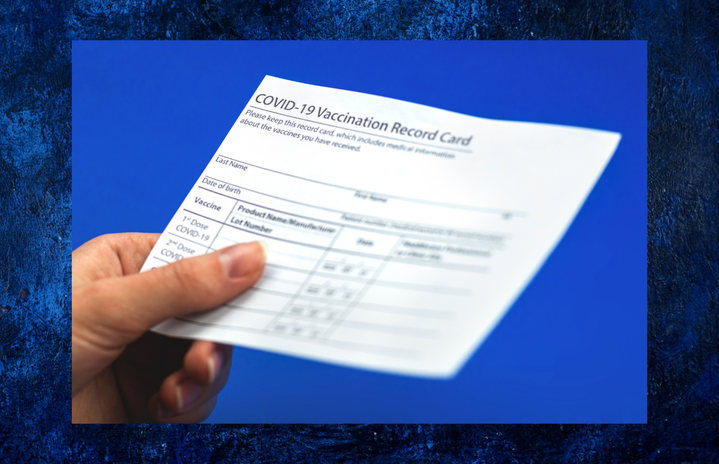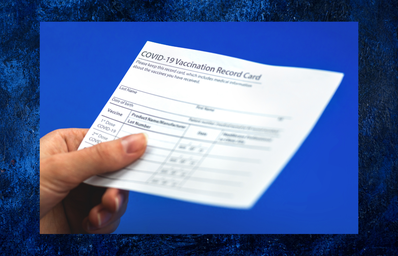Currently, there is a constant push for vaccination among us by our news outlets, social media, schools, workplaces, families, and peer groups. This push introduces the controversy between the “pro-vaxxers” and “anti-vaxxers,” which pushes many of us to feel that we must pick aside and make the difficult decision of whether we will or will not get the COVID-19 vaccine. However, what about the category of individuals that are on the fence about the vaccine? As a former member of this category, I have written this article in hopes of helping you make your decision. Let it be noted that I am not here to tell you what to do. Instead, I am here to offer my own experience with the vaccination and tell of the anxiety I felt towards it—the same or similar anxieties you may feel. Also, I will explain how important being informed is in whatever vaccination decision you choose. Lastly, I will bring much-needed attention to vaccine peer pressure and how it impacted me. I hope that by the end of this article, you’ll be able to hop off of the fence and make your way to the entrance of whatever your decision may be.
Let’s begin with my experince
April 20, 2021, was the day I was scheduled to receive the first dose of the COVID-19 Pfizer vaccine. As the time of my appointment that day began to roll around, I felt so much anxiety and apprehension. As I rode to the mass vaccination site in my hometown, a ride that seemed endless, all of the horrific stories I had heard about individuals having bad reactions to whatever contents were in the vaccine and various pro and anti-vaccination stances began to fill my thoughts. However, there was no turning back. I had already set the appointment, and my mom surely wouldn’t allow me to waste her car gas, so I realized that it was best that I suck it up. The vaccination line began to shorten, and in the blink of an eye, it was my turn to receive the vaccine. I sat down in the chair, as my legs shook with anticipation. “Okay,” the nurse said, “This will only be a quick…pinch. You’re all done.” Was I done? Was it over? I wasn’t sure what else I expected, but I couldn’t believe that I had just received the medical advancement of the decade- a vaccine that would soon be in history books. The days following, I expected the worse and was afraid that my body would reject the vaccine, causing an illness or becoming sick. However, as I monitored my health for the next two weeks, I had only experienced some pain in the arm in which I received the dosage and a little bit of nasal congestion. Other than that, I was fine. So, where did all of the stress and anxiety I felt when getting the vaccine come from? Where did the endless with and pressure that I felt before getting it come from? Well, let’s rewind a bit.
“All students are required to show proof of COVID-19 vaccination to be permitted to return to campus during the Fall 2021 semester,” read the letter from Hampton University. Darn. Of course, the report that there were plans to move forward with an in-person semester was like music to ears, but seeing the words “required” and “vaccination” in the same sentence was unsettling. When I received this letter, it dawned on me that I had not possessed any true opinion or stance on the vaccine, and I had no first-hand knowledge of the vaccine. The only familiarity with the vaccine that I had was through the out-of-the-blue stories on the news about the vaccine that I would hear when I watched the news occasionally, the opinions of my family, and short vaccine awareness posts on social media. Sure, I listened to all of these sources, but nothing grabbed my attention enough actually to read about the vaccine for what it actually is. Since I didn’t have much knowledge about the vaccine, I didn’t understand why I had so much anxiety about it.
Now that it has been almost six months after receiving my second dose of the Pfizer vaccine, I understand that much of my anxiety about the vaccine was linked to two aspects. Firstly, obviously, I was misinformed about how the vaccine works. Secondly, I allowed the peer pressure of others and various opinions and on the vaccine pull me in every direction. I will expand on these aspects that contributed to my vaccine anxiety and explain the importance of overcoming both.
from misinformed to informed
Since the vaccine came out into the public, information was pouring into my eyes and ears at a nonstop rate. Somewhere along the way, I believe that the most valuable and valid facts about the vaccine had become muddled. Often, we do not engage ourselves in researching new medical advancements and social and political issues because there are sources that have seemingly done all of the hard work for us. Our only task is to take it all in. However, this is incorrect. Now, I understand that having your own knowledge of the facts is vital because when putting something foreign into your body, whether it is a vaccine or not, without any understanding of the effectiveness, risks, and development, you are doing more harm than good for your well-being. It is better to know the facts for yourself and depend on credible sources than to move with the crowd’s group thinking, mass hysteria, and misinformation.
For example, because I wasn’t appropriately informed about the vaccine and had listened to unreliable sources, I believed it was possible to receive COVID-19 from the vaccine itself. However, according to the CDC, the vaccine prompts cells to replicate a harmless “spike protein” similar to those found on the virus that causes coronavirus. This is done to help our immune system recognize the spike protein as a foreign invader and take an active response in ridding the body of it. So, in summation, I learned that the vaccine teaches our immune systems to fight the spike protein just as it would any other infection. Also, the arm pain and nasal congestion that I had after my dosages of the vaccine resulted from my body recognizing and fighting the spiked protein.
Overall, doing my own research and relying on credible sources to inform me about the vaccine, such as the CDC, helped me to be much more informed and it helped to soothe my anxiety. When you don’t have all of the facts, it is easy for worry and apprehension to consume you, and you also become liable to spreading false information. Do yourself a favor and become informed before making your vaccination decision.
In order to stay informed and have concerns of your own answered, here are some links that helped me become more informed about the vaccine:
- About COVID-19 Vaccine: https://www.cdc.gov/coronavirus/2019-ncov/vaccines/about-vaccines/index.html
- Myths and Facts about the Vaccine: https://www.cdc.gov/coronavirus/2019-ncov/vaccines/facts.html
- Types of Vaccines available: https://www.cdc.gov/coronavirus/2019-ncov/vaccines/different-vaccines.html
- U.S. COVID-19 Vaccine Tracker: https://www.mayoclinic.org/coronavirus-covid-19/vaccine-tracker
Now, I would like to share how peer pressure and the fear of being judged for my decision impacted me.
The impact of vaccine peer pressure , society’s views, & Its toll on me
I realize the last triggering factor of the anxiety was how I had watched families, friends, co-workers, and politicians become increasingly divided because of the ideas of receiving or choosing not to receive the COVID-19 vaccination. I felt that it had become such a controversy because of how quickly-in the eyes of some- it was developed, the terrible experiences that specific individuals had, the conflict of vaccination with religious perspectives, and various other factors. With this in mind, I did not want to disclose that I had to get the vaccine or even take a position, not only because of how misinformed I was but because I feared how others would view me based on my decision. I feared being “canceled” for not considering how vital getting the vaccination is too controlling and eventually ceasing the pandemic. Nor did I want to become an outcast in my family or by other members of the Black community who viewed the vaccine as a voluntary decision to be the government’s “zombie,” “Guinea pig,” or “test dummy” (all names that I was eventually called). It was difficult for me to know who or what to believe when various perspectives made good points because I knew that I would receive backlash from whichever side I did not choose.
Here’s what I mean by “various perspectives.” When the vaccine rolled out, there was division in the Black community on whether Black people should receive the vaccine. I experienced these debates firsthand within my friend groups. The side that advocated for Black Americans to receive the vaccine was based on the fact that due to preexisting medical conditions, poverty, and lack of health care Black Americans are more vulnerable to COVID-19 and thus should receive the vaccine. The opposing argument was that Black Americans should not receive the vaccine because of America’s history of unethical and inhumane medical practices on Black Americans (i.e., the Tuskegee Syphilis study). Here I was caught in a dilemma of the dual consciousness. As an American, I acknowledged the importance of vaccination. However, as a Black person, I understood the lack of trust in American medicine and empathized with the trauma that generations of fellow Black people have experienced. Because of the pressure that I felt from both perspectives, I was at a constant inward battle, which caused me to have an unsettling feeling on the day of and days following my vaccination.
Of course, I acknowledge that not everyone on the fence about vaccination is a part of the black community and can relate to this aspect. Still, I am sure that there are multiple perspectives within your community, family, or friend group, and you may feel obligated to succumb to one of them. Despite whatever views on the vaccines surrounding you and whatever amount of pressure you feel, I urge you to consider each perspective for yourself, how they align or conflict with your values, and make a wise choice that works for you.
In closing…
Both a lack of information about the vaccine and various pressuring perspectives about the vaccine’s effectiveness, or lack thereof, can cause you to be met at a crossroads in our vaccination decision just as I was. Therefore, I have some advice on how you can decide whether or not you receive the vaccine.
As I have said, several times throughout his article, rely on credible sources to provide you with any information that you seek about the how, where, and why’s of the vaccine. It also does not hurt to talk to a family member or close friend about their experience with the vaccine in order to gain a less generalized perception of the vaccine and its effectiveness. Secondly, do not rush in making your decision because you feel that it is something that you MUST do because the media, local politicians, or your favorite celebrities are urging you to. Vaccination is a personal choice. Though, the choice you may make may affect whether you can return to campus, eat at a certain restaurant, or visit a certain country, it is your choice just as it was my own choice to get vaccinated. Please know that you are the person that has to sit in that chair and allow a nurse to stick the needle into your arm. Do not base your vaccination decision off of what it is you think others want you to do or because it seems to be a “trend.” Be informed, wise, and mindful of your vaccination decision. Understand the positive and negative consequences.
I had to learn on my own that being informed and making my decision for myself was the only way I could have a say in the conversation of vaccination. Be true to yourself, your values, and your gut. Everyone is entitled to make their vaccination decision. Do not allow anyone to pressure you into receiving or not receiving the vaccination, and do not be that person to pressure others. Lastly, continue to stay masked up, social distance, and prioritize hygiene and sanitation whether or not you decide to get vaccinated. COVID-19 cases may be decreasing, but she is still very much out here.
I hope that my vaccination story and all of the aspects of this article have helped you figure out where you stand on the vaccine in the midst of all of the controversy surrounding us. Hopefully, you have gained information where you were misinformed and have learned how to work through the pressures of vaccine perspectives. Now is your time to decide whether you are to be or not to be vaccinated.


